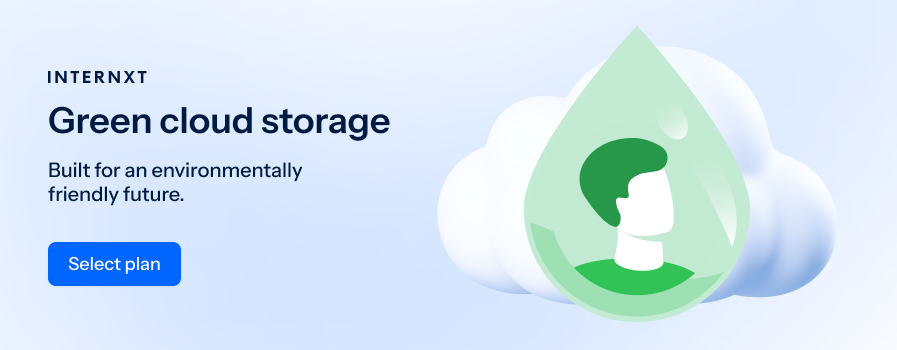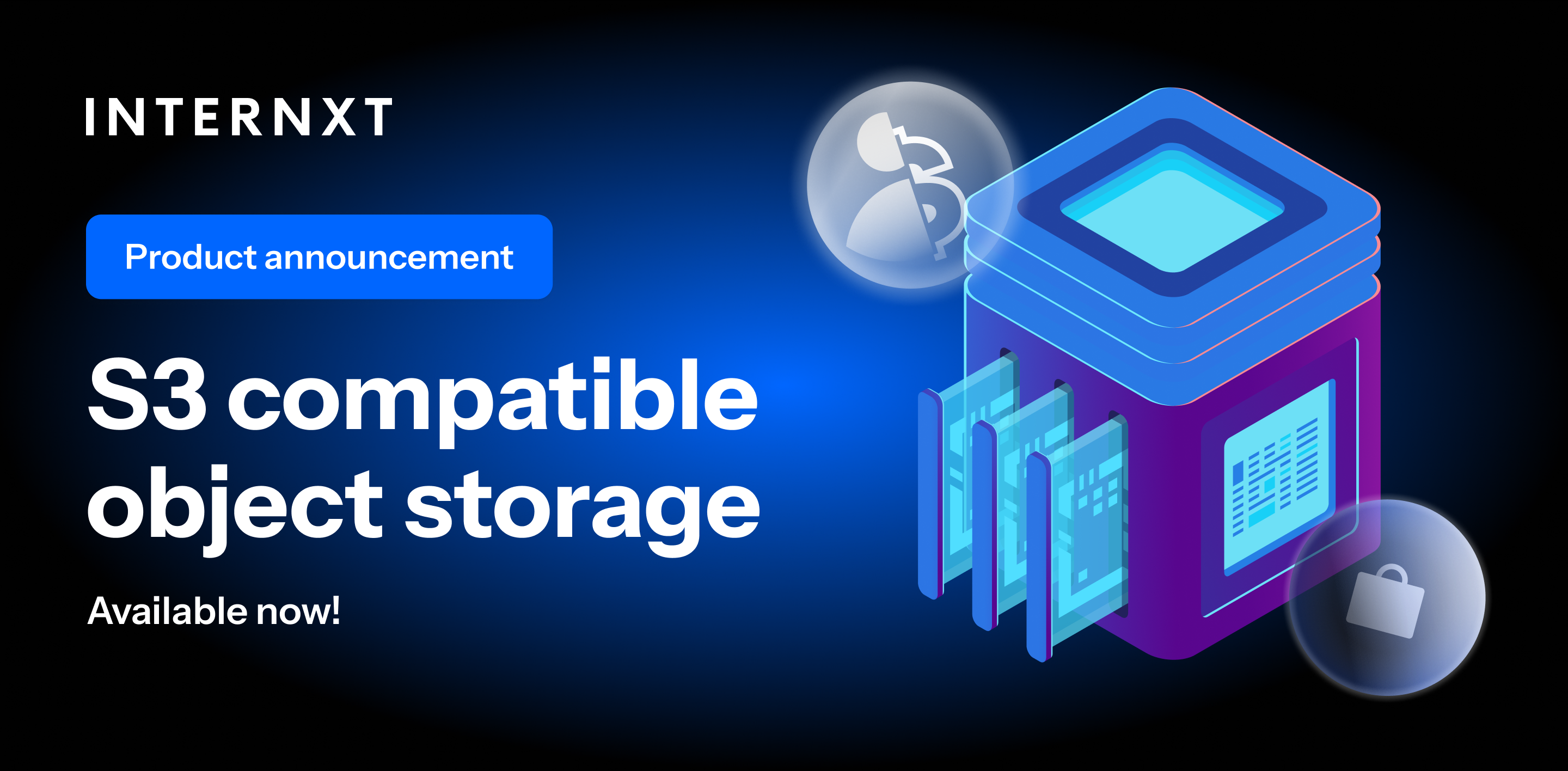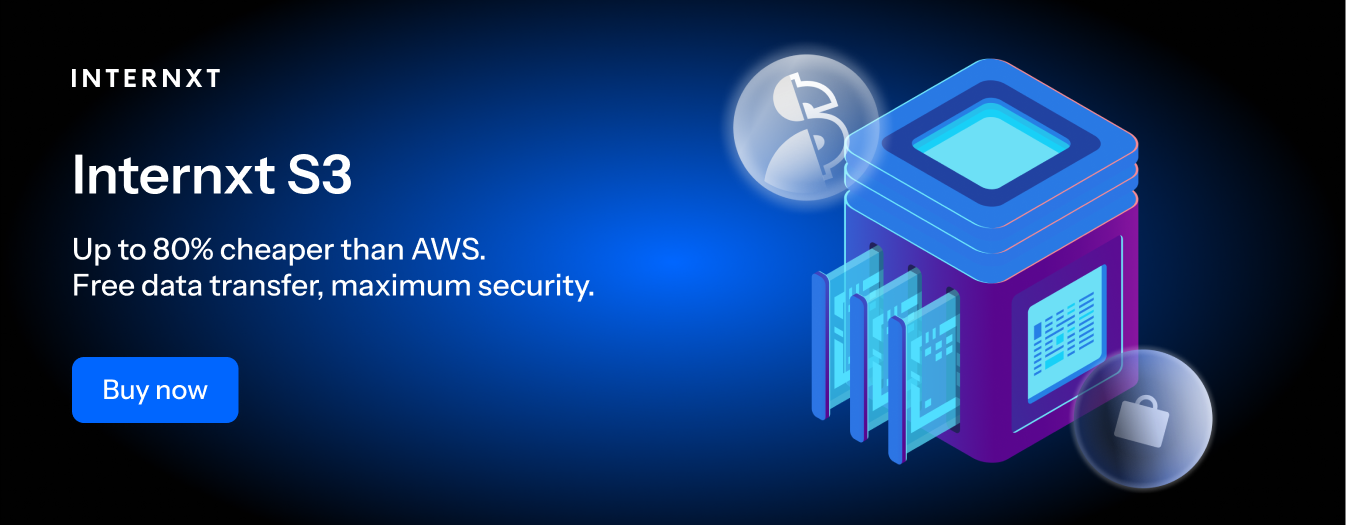Enterprise Cloud Storage Solutions

Enterprise cloud storage solutions require strategic thinking from companies and teams due to the large-scale data that needs to be managed.
Aside from managing the storage, other things must also be considered, such as what compliance standards must be met depending on the industry you work in, who has the credentials to access and manage sensitive information, and who will be managing the infrastructure of your cloud.
To make things easier, this article will cover the main use cases of enterprise cloud storage solutions, the different storage options available, and which company can best meet your storage needs.
Table of contents
- Main use cases of enterprise storage
- Enterprise cloud storage architectures
- Types of enterprise cloud storage solutions
- Enterprise cloud storage solutions
- How to choose from these enterprise cloud storage solutions
Main use cases of enterprise storage
These are the top industries that can benefit from enterprise cloud storage solutions, as these require compliance, secure protocols, and measures to protect clients and customers from data leaks or breaches.
Finance
Finance is a key industry that must make use of secure enterprise cloud storage solutions due to the amount of sensitive data finance companies must manage.
Financial enterprise storage will need to store customer records, transaction histories, and regulatory reports. Cloud storage for the finance industry ensures data integrity, supports compliance with strict financial regulations.
Law
Cloud storage for law firms requires a secure platform to securely store case files, client information, contracts, and legal research.
Cloud storage can also provide secure and confidential file sharing to allow for quick access to documents for court proceedings and client services. Reliable storage also provides backup and disaster recovery, protecting sensitive legal data from loss or unauthorized access.
Healthcare
Healthcare providers are the number one targeted industry for data breaches, with many hospitals or medical centres reporting data breaches each year.
Therefore, choosing enterprise private cloud storage is critical for securely managing patient records, medical images, and research data to prevent future data breaches or ransomware attacks.

HIPAA compliance is another important factor to consider when choosing enterprise cloud storage solutions for healthcare to protect sensitive health information and prevent compliance fines and data breaches.
Enterprise cloud storage architectures
Enterprise cloud storage is also based on the following different architectures that manage how your data is stored, accessed, and processed.
Data warehouse & data lakes
Data warehouses and data lakes are used together for enterprise private cloud storage as a way to balance a structured way to manage data.
A data warehouse stores data in a centralized platform designed for analysis and decision-making, allowing enterprises to turn past and present data into actionable insights. A data lake is used when an organization needs to collect and store massive amounts of raw or varied data for future use, advanced analytics, or machine learning.
In many enterprises, both are used together: the data lake acts as the central repository for all raw data, and the data warehouse uses curated parts of that data for structured analysis.
Edge storage
Edge storage is a data architecture type that works with enterprise private cloud storage by handling data where it is created and close to the edge, instead of sending everything directly to the cloud.
Edge storage handles data locally where it is created to reduce latency and speed up handling data for IoT devices, autonomous systems, or remote data collection. As these systems generate large volumes of real-time data, they require the quick processing capabilities of edge systems to get faster response times.
Types of enterprise cloud storage solutions
Enterprise private cloud storage
Enterprise cloud storage solutions are mainly broken down into private and hybrid solutions. Private enterprise storage gives the enterprise complete control over its files and data, as everything is handled on-site.
With enterprise private cloud storage, companies have total control over file security, compliance, access controls, and cloud storage backup solutions. Everything, including maintenance and security, is handled by the company and its employees.

So while enterprises have more control over their data, they must invest in infrastructure, manage updates, ensure security, and handle ongoing maintenance internally. As a result, this option is generally only available to larger enterprises due to the costs and complexity of managing the cloud.
Public
If your company doesn’t have the resources available to manage the cloud infrastructure or security, another option is public cloud storage.
Your files are stored and managed by a third-party who are responsible for the infrastructure, maintenance, security, updates, and scalability. There are many public enterprise cloud storage solutions available, offering secure and scalable storage to meet your enterprise or business storage needs.
Hybrid
If public and private enterprise cloud storage solutions seem appealing, you’re in luck. With hybrid cloud storage, you can combine the security and control of private cloud storage with the scalability and cost efficiency of public cloud storage.
For example, if your enterprise has highly sensitive data that needs maximum security, you can store this data using a private cloud model.
On the other hand, less private data can be stored with a public cloud model, reducing the management and costs of a fully private model, while maintaining the flexibility and flexibility and scalability of a public cloud provider.
Enterprise cloud storage solutions
AWS, Azure, Google Cloud, IDrive
Amazon Web Services, Microsoft Azure, Google Cloud, and IDrive are the most popular enterprise cloud storage solutions available on the market, as they offer many features, including object, block, and file storage.

AWS has block storage and object storage solutions available, including:
- Amazon S3 object storage
- Amazon EBS block storage
- Amazon Glacier for long-term archiving of data
Microsoft Azure integrates well for enterprises and teams working within the Microsoft ecosystem. It offers the following storage types for enterprises:
- Azure Blob Storage for unstructured data
- Azure Files for managed file shares
- Azure Disk Storage for high-performance workloads
Finally, Google Cloud offers:
- Google Cloud Storage object storage
- Persistent Disk block storage
- Nearline or Coldline for infrequently accessed data (30 or 90-day minimum charge)
- AI and analytics integration
These services can be integrated as your main or hybrid cloud storage solution, but if you want a cheaper alternative with no ingress of egress fees, we have an alternative object storage solution to meet your needs.
Internxt S3
Internxt S3 is an object storage solution and an alternative to AWS, Azure, and Google Cloud. With its fixed pricing plan of just €7/TB/month, you could save up to 80% compared to competitors.
Internxt S3 is a hot cloud storage solution, meaning you can quickly and easily access your data as object storage is built to perform multiple operations simultaneously for faster data retrieval.
All your files are protected with end-to-end encryption and backed up in multiple servers for increased redundancy and data security.
With full ISO 27001, HIPAA, GDPR, and SOC 2 compliance, Internxt provides your business with everything necessary to keep sensitive company and client data safe and private.
Unlike other object storage doesn’t have additional data transfer costs, so you can set up and scale your plan based on your needs, without worrying about any additional costs.
You can get started from just €7 per month, and whenever you need to add or reduce your storage, you can modify it to a plan that suits you to modify your plan to meet your enterprise or business needs.
To find out if Internxt S3 is right for you, you can fill out a contact form on our website, and a member of our sales team will be in touch.
Enterprise private cloud storage options
If you want to combine your enterprise cloud storage solutions with private options, the following service offers private cloud storage:
- IBM Cloud Virtual Private Cloud (VPC): build isolated private clouds for your business operations.
- VMware vSAN: turns an enterprise’s existing servers into a shared, high-performance private storage environment.

Whichever option you choose, ensure you research each solution carefully to ensure it meets your team or company’s specific requirements, including compliance standards, performance, scalability, security, support, and overall cost.
How to choose from these enterprise cloud storage solutions
Choosing the right cloud storage can feel overwhelming for everyone, whether it's for individual or enterprise use.
Therefore, for enterprise cloud storage solutions, your team should consider:
- Cost
- Scalability
- Compliance needs
- Potential maintenance costs
- Encryption
- Speeds
- Data backups
For a secure platform to quickly access large amounts of data with the best security and price available, consider integrating Internxt S3 object plan into your business or enterprise to simplify your data management needs.

